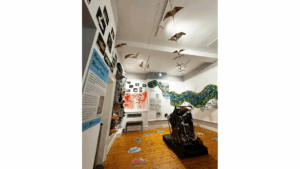- Posted on August 14th, 2025
Tees Valley Museums – Uniting for Environmental Advocacy and Action
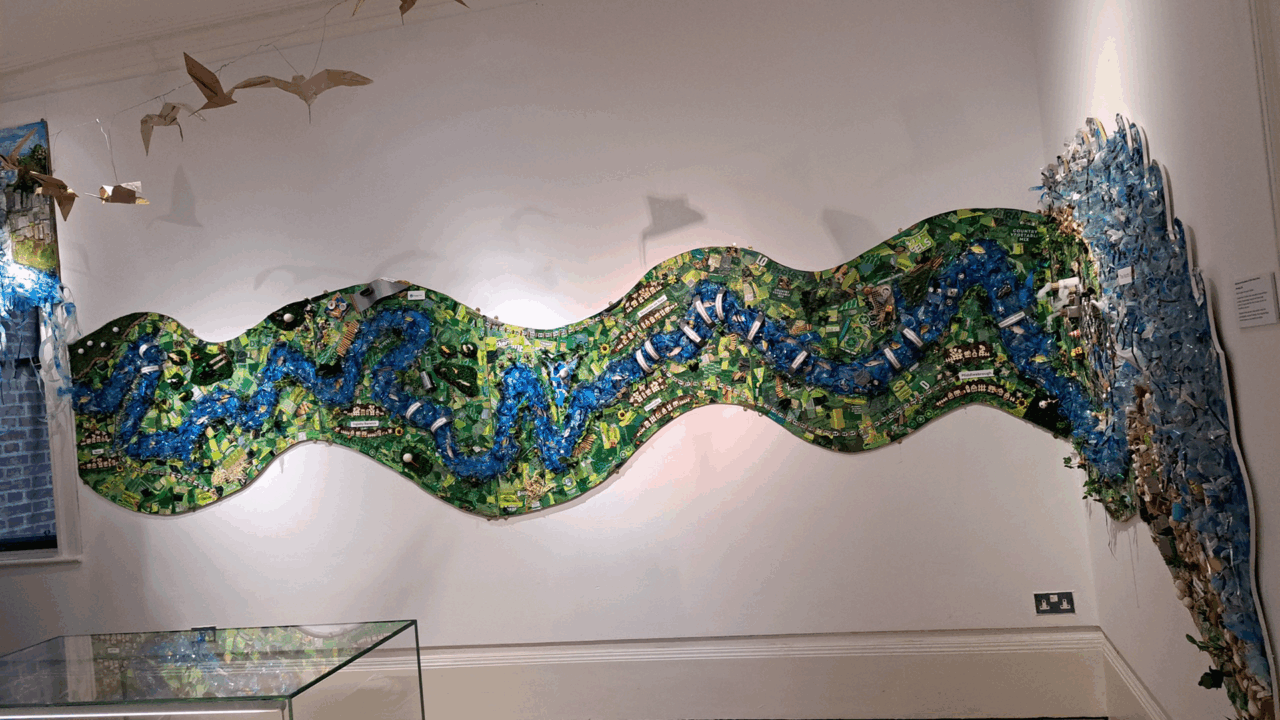
For Arts Council England and Julie’s Bicycle’s annual report 2023-24, we feature over 50 practical examples of cultural organisations taking climate action including in depth case studies like this one. Check out the full interactive report here.
This case study was written by Tees Valley Museums – a consortium consisting of the museum services of Stockton-on-Tees, Darlington, Hartlepool, Middlesbrough and Redcar & Cleveland. They outline their collaborative approach to embedding environmental sustainability across their operations and programming, focusing on advocacy, carbon footprint reduction, and sustainable practices through dedicated resources, green champions, and engaging community projects like the “Recycling the River Tees” exhibition.
About the Consortium
Tees Valley Museum Group is a relatively new partnership formed in 2018 to be a National Portfolio Organisation. Each museum service retains its independence controlling its own budget and programming. The Arts council NPO funding is used to develop our practice and add innovation and additionality to each service’s core offer.
In our model of delivery Environmental Sustainability forms a key part of our work. Each service is part of a local authority all of whom are committed to acting in ways that will reduce carbon and create better environments. The practical steps we employ are:
- A dedicated budget to support green activity – currently £25,000 per year, though this is a minimum with cross cutting work increasing budget and staff resources available to deliver change.
- Additional funding through Forward-Thinking Exhibitions which provide additional wrap around activity for core programming and can include environmental work.
- Each partner to have a green champion to advocate for sustainability and advocacy for the environment in our programming.
- Hosting of a minimum of 4 green champion meetings a year where ideas best practice can be disseminated. This makes us all think about our environmental commitment.
No one year’s activity is the same but will always include at least one programming event that advocates for the environment. As a collective of museums we recognise the role we have to play in working towards climate justice and have continued to bring messages about environmental issues to new audiences through our Forward-Thinking exhibitions and Go Green programming. Museums have a unique platform to take on this role.
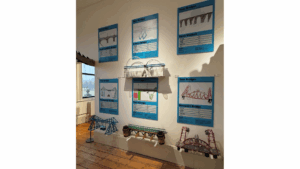
Practicalities of working as a consortium
As a consortium, we don’t have joint goals beyond a commitment to work towards environmental sustainability. It is important to support the aims of the individual services rather than impose policy from above. We spent time discussing the aims of each partner. These were then drafted into our Green policy and action plan.
Each service has its own education team which operates successfully as individual entities with varying resources, budget and staff capacity. Centrally, a new position has been created (Creative Learning Officer), and this post coordinates and advocates for joint initiatives as well as having additional resources and capacity to support new work. This role also brings together the learning officers from across the partnership every three months for formal meetings where work plans are discussed. This is a similar model to the Go Green and Forward-Thinking activity streams we have.
Each service develops their own core programme; they don’t have to agree on content as such, but they all meet regularly through various working groups to pass on information.
As a Consortium, we want to achieve 3 things:
- Advocacy for the environment in programming
- Reducing our carbon footprint
- Making our practice more sustainable
One of the aspects we have been focusing on is advocacy for the environment in programming and this can be seen from the actions we’ve taken below:
- Preston Park Museum and Grounds presented Flight: weaving a home for butterflies & moths. The exhibition celebrated the beauty of butterflies and moths, sustainability and the environment, and explored an important message about the decline of the butterfly population and loss of habitat.
- Preston Park Museum hosted the Tree council’s force for Nature Exhibition. This exhibition shares the voices and wishes of young people for a greener, healthier, more tree filled planet. Alongside this, community groups and around 300 school children helped to plant a hedgerow along the banks of the Tees. There was also collaborative CPD delivered at the Museum alongside the Wildlife Trust and the Tree Council.
- The Museum of Hartlepool has recently hosted Nature + Ecology, an exploration of nature, habitat, and the natural landscape through art. Featuring works by students from The Northern School of Art and curated alongside objects from the Museum of Hartlepool collection.
- Across the Consortium our CYP programmes continue to put climate education at the forefront of activity. Both Hartlepool Art Gallery and Preston Park Museum & Grounds have hosted Eco Toddler Takeovers including activities such as introducing young children to the concept of recycling.
- Kirkleatham museum has also run hedgehog home building workshops. These introduced 16 new hedgehog nesting sites around the green spaces of the museum and was a collaboration with local hedgehog charity Cleveland Hedgehog Rescue.
- We also supported an eco-recycled Valentine’s Day card workshop at Kirkleatham in February, showing families how to turn waste paper and cards into new objects.
Every consortium partner (the local authority Museum Services) is committed to the green agenda. The NPO through its structure and resources ensures it stays on the agenda even when there are pressing priorities that could distract individual services away from working on the environment.
The key to this is that the NPO creates thinking space to consider the environment and work on policies and actions. This is enabled by all the partners having green champions who are supported by regular meetings and resources dedicated to promoting green activity.
What we would like to achieve as a consortium is perhaps best described through practical application of our values in a recent project.
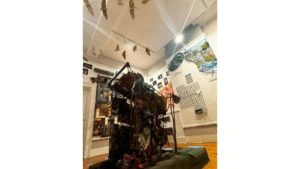
Recycling the River Tees Project
In 2023, we were approached by the Canal and River Trust to work on a collaborative project aimed at engaging audiences with the River Tees. We worked with various community groups on an exhibition looking at the River Tees’s industrial history and contemporary problems with litter and sewage, and how these can be resolved to make a clean and safe river for wildlife and residents to enjoy. This has resulted in an exhibition at Kirkleatham Museum this summer.
Our commitment to environmental advocacy includes delivering a piece of programming in partnership or with the support of an environmental organisation. This adds authority and expertise to any project that we develop. Through networking we built a relationship with the Canal and River Trust and after a few months of planning agreed on the project. Part way through this we also added a second environmental partner, the Tees Wildlife Trust. This was done to broaden our activities and bring additional staff resources to the project.
Recycling the River Tees is a collaborative programme supporting schools and young people with identifying the significance of the river in their locality as well as its importance for industry and employment in contrast with the impact of pollution on the local landscape. Using museum collections to explore local wildlife and habitats alongside images of the industrial landscapes along the river, participants responded by creating an exhibition developed using rubbish from the river.
The project has been supported by two artists and a writer who have worked alongside two primary Schools (Tilery and South Bank) situated close to the river in areas of high deprivation, Level 1, 2 and 3 art students from Darlington College and the Princes Trust.
Exhibition
The exhibition displays the stark contrasts between the beauty of the river and its industrial heritage. Recognising the fine line between the Tees’ benefits for both recreation and employment has sparked debate and conversations with participants which is reflected in the exhibition, inviting visitors to engage with their own thoughts in response to the displays.
The playful exhibition also invited the youngest visitors to identify between wildlife and pollution in an interactive floor game. Visitors of all ages could create pledges to the river, sharing them on a noticeboard:
“I promise never to litter in the sea or river” – Betsy, aged 8
“I really love the River Tees. People stop putting toxins into it” – Mark
“Don’t litter it’ll make me jitter” – Pete
Kirkleatham Museum have pledged to use environmentally friendly exhibition materials throughout their galleries, including this exhibition. It is anticipated that the exhibition will be displayed elsewhere once it comes down in Kirkleatham, sharing experiences between museums.
Further information about the exhibition is on the Tees Valley Museums website.
Validation and outcomes
Evaluations showed informed changes in participants’ understanding and behaviour around the local environment and the River Tees.
Participants recognised the impacts of pollution along the River Tees and the importance of recycling. 36% of College Students had not visited the River Tees before, and the project helped to identify the river as a source of inspiration and creativity.
“I have learnt that you can turn anything into art, even rubbish! And you can turn anything bad to good.”
– Student, Tilery Primary
The project has consolidated relationships between Tees Valley Museums, educators, the Wildlife-Trust and The Canal and River Trust. There are future opportunities for community events and schools’ resources.
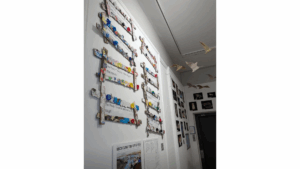
Next Steps
In the next twelve months, we will continue with our environmental ambitions:
- Hopetown Darlington will be building an ambitious community garden, bringing greenery and pollinators to a previously industrial landscape.
- Preston Park Museum & Grounds aim to produce a short film promoting public transportation as a way to access the museum.
- The Consortium as a whole will continue to ensure that more of our staff are carbon literacy trained to empower them to make environmentally responsible choices, both personally and professionally.
Kirkleatham Museum will be inviting classes of children to participate in a competition aimed at getting children to think about the environment and recycling.
Tees Valley Museums are evolving and responding to the ideas and suggestions of the broad selection of groups that engage with the programmes on offer. Environmental care and responsibility is at the heart of all that we do.

